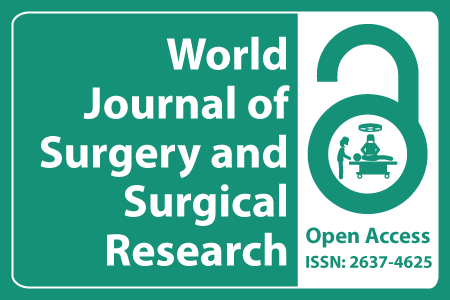
Journal Basic Info
- Impact Factor: 1.989**
- H-Index: 6
- ISSN: 2637-4625
- DOI: 10.25107/2637-4625
Major Scope
- Ophthalmology
- Breast Surgery
- Surgical Oncology
- Hepatology
- Emergency Surgery
- Cardiac Surgery
- Gastroenterological Surgery
- Cardiothoracic Surgery
Abstract
Citation: World J Surg Surg Res. 2023;6(1):1465.DOI: 10.25107/2637-4625.1465
Analysis of the Significance of DNASE1L3 in Immune Infiltration of Colon Adenocarcinoma
Chen J, Zhu J, Sun P, Wu W and Liu Z
Department of General Surgery, Shenzhen University General Hospital & Shenzhen University Clinical Medical Academy, China
PDF Full Text Research Article | Open Access
Abstract:
Background: Several studies have shown the crucial role of DNASE1L3 in regulating immune function in various diseases including Systemic Lupus Erythematosus (SLE) and cancers. However, the function and expression of DNASE1L3 in Colon Adenocarcinoma (COAD) remain obscure. The aim of this study was to explore the immune function of DNASE1L3 in COAD through a comprehensive bioinformatic analysis.
Objective: To study DNASE1L3 expression in colorectal cancer through multiple databases. Use bioinformatics analysis to learn about the influence of this gene on clinical prognosis and immune function in colorectal cancer, and to explore its potential biological function.
Methods: We obtained transcriptome data of COAD and normal samples from The Cancer Genome Atlas (TCGA) and identified Differentially Expressed (DE) mRNAs. The difference mRNA between COAD and normal samples and the difference mRNA between stage I and stage IV were respectively excavated, and then the intersection was taken. DNASE1L3 was determined the significant DE mRNA. Further, we obtained the different expressions of DNASE1L3 integrates the normal tissue data in the TCGA tumor tissue data to analyze the expression differences of 20 tumors. DNASE1L3 was further subjected to an analysis of expression in a different stage of COAD. We evaluated the influence of DNASE1L3 on clinical prognosis using Gene Expression Profiling Interactive Analysis (GEPIA) in COAD patients. To demonstrate the relationship between immune function and DNASE1L3, we investigated whether DNASE1L3 expression is related to the level of immune infiltration in COAD. We separately counted the number of neoantigens in COAD and analyzed the relationship between DNASE1L3 expression and the number of antigens. We analyzed the correlation between DNASE1L3 expression and MSI (Microsatellite Instability), using Spearman's rank correlation coefficient. In addition, we analysis the enrichment function of DNASE1L3. Finally, we performed immunohistochemical analysis on tissue microarray of colon adenocarcinoma.
Results: In this study, we observed significantly down-regulated expression of DNASE1L3 in many different cancers including COAD, which also correlated with grade. Low expression of DNASE1L3 was significantly correlated with poorer Overall Survival (OS) in COAD (OS HR=0.4, P=0.032). Low expression of DNASE1L3 was found with a poor prognosis. DNASE1L3 expression was positively correlated with infiltrating levels of CD4+ T and CD8+ T cells, B cells, macrophages, neutrophils and Dendritic Cells (DCs) in COAD. DNASE1L3 expression showed strong correlations with diverse immune marker sets in COAD. Enrichment functional analysis revealed that DNASE1L3 was associated with immunoglobulin complexes, antibacterial humoral responses, and humoral immune responses.
Conclusion: These findings suggest that DNASE1L3, which functions as a tumor suppressor gene in COAD, might be a potential therapeutic target. It is correlated with prognosis and immune infiltrating levels, including those of CD4+ T and CD8+ T cells, B cells, macrophages, neutrophils and Dendritic Cells (DCs) in COAD patients. These findings suggest that DNASE1L3 can be used as a prognostic biomarker for determining prognosis and immune infiltration in COAD. These findings suggest that DNASE1L3 can be used as a prognostic biomarker for determining prognosis and immune infiltration in COAD.
Keywords:
Colonic adenocarcinoma; Colorectal cancer; Bioinformatic analysis; DNASE1L3; TCGA; MSI
Cite the Article:
Chen J, Zhu J, Sun P, Wu W, Liu Z. Analysis of the Significance of DNASE1L3 in Immune Infiltration of Colon Adenocarcinoma. World J Surg Surgical Res. 2023; 6: 1465..













